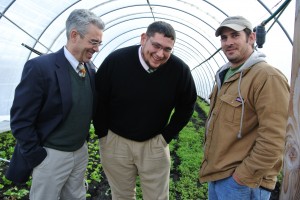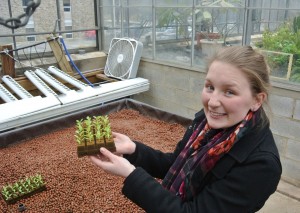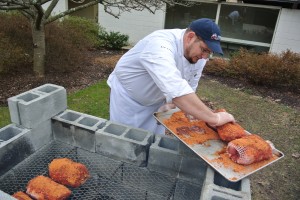At Goucher College, More Sustainable Relationships Blossom

Resident District Manager Norman Zwagil, General Manager Ty Paup, and Farm Manager Alex Persful inside one of the greenhouses at Big City Farms
As a fellow, I spend much of my time traveling to our cafés along the East Coast, visiting Farm to Fork partners and talking to guests about what makes us great. At the best of times, though, I get to just sit and listen as they explain it to me.
My visit to Goucher College in Baltimore was one such time. At dinner with a group of Goucher’s most environmentally active students, I sat down prepared to explain complex environmental and social issues or answer questions about how we’re addressing them through our purchasing policies. Instead, the students had a feast of compliments for me: they wanted to gush about their Bon Appétit team.
They have a lot to be proud of. Around campus, Resident District Manager Norman Zwagil seemed to me part mayor and part rock star. His excitement was infectious, and I could hardly keep up as he jumps from topic to topic, leaving a sustainability-scented cloud in his wake. Upstairs, General Manager Ty Paup was smoking pork on an outdoor grill that he built with the college’s permission. Over an incredible lunch that included house-made seitan in a vegan Thai curry, I had the pleasure of hearing about this chef’s other passion: farming.
Through their Farm to Fork purchases, Norman and his team are supporting positive change in the tides of agriculture in the Chesapeake Bay region — and one such purchasing relationship is with Big City Farms, a half-acre of greenhouses. Right in the middle of Baltimore, it’s the first farm in the country built on top of an old parking lot, covered with 6 to 8 inches of compost. Farm Manager Alex Persful adds a homegrown mixture of probiotics to the soil, which break down and release more of the nutrients from the compost over time. The lettuces grow year round, and because the compost is so nutrient rich, it won’t be depleted for the foreseeable future.
When I hear “greenhouse,” I think “energy intensive.” Fortunately, that couldn’t be further from the truth when it comes to Big City Farms. The greenhouses aren’t heated with anything except natural sunlight, with the exception of the nursery. The seedlings need to stay slightly warmer to keep from freezing, which is accomplished by water tubes that run underneath the length of the greenhouse. The tubes circulate water in a closed loop system, and the water is heated by a decomposing compost pile nearby. The only energy input required is the electricity for the water pump.

Goucher College freshman Emily Timothy shows off the seedlings that the campus Ag Co-Op will grow in the spring with a student-made hydroponic system
Big City Farms is creating jobs in Baltimore and growing fresh, healthy greens with little detriment to the environment through a creative and resourceful kind of agriculture. With the farms’ plans to expand over the next few years, Bon Appétit’s commitment to purchasing from them is an important component of that growth.
When I drive away from visits to our cafés I am often bursting with pride so robust that it comes out as a huge smile or a skip in my step. We’re fortunate, because sustainability is not only at the heart of what we do, but it goes hand in hand with what we do. We succeed at sustainability because sustainability helps us to succeed. And while we recognize that as a food service company, we still have a long way to go, I couldn’t be more proud to be part of the journey.
